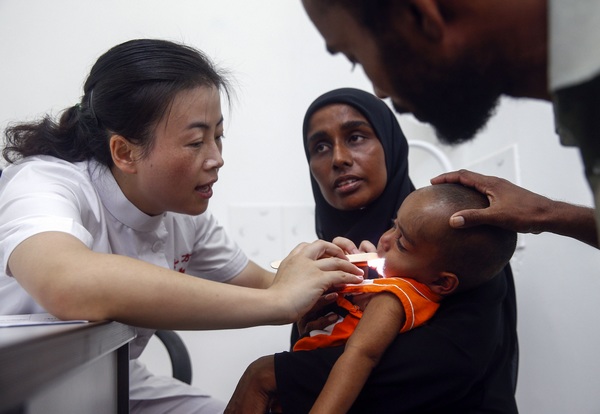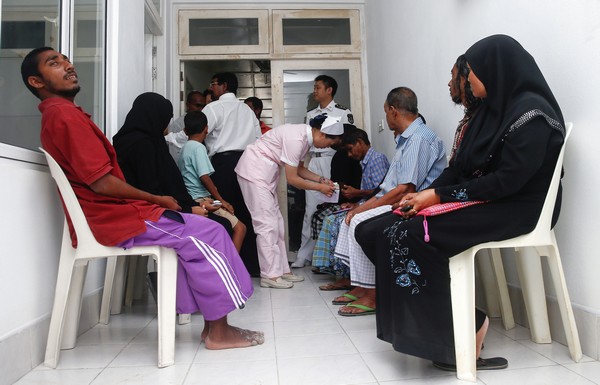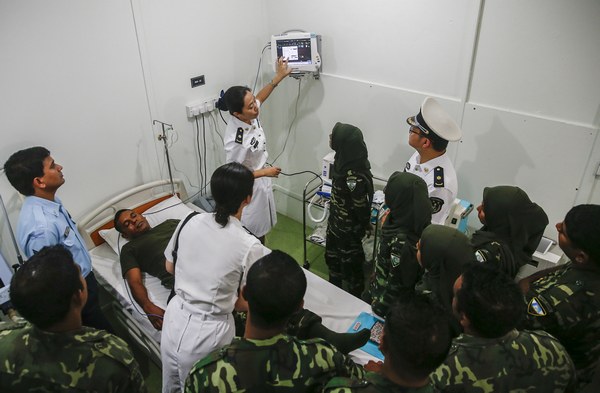Hospital ship lends a helping hand
Updated: 2013-07-10 07:58
By Peng Yining (China Daily)
|
|||||||||||
Peace Ark provides free checkups and treatment for locals at holiday destination, reports Peng Yining in the Maldives.
As the sole doctor at the only clinic on K. Guraidhoo, a remote island in the Maldives with a population of just 4,000, Lokendra Singh is accustomed to doing everything himself.
 |
|
Pediatrician Du Kan checks a child on Eydhafushi in the Maldives. Du is on the hospital ship Peace Ark for an aid mission to Asian and African nations. Zhang Hao / for China Daily |
The 42-year-old general practitioner said he pulls teeth in the morning, stitches gashed chins in the afternoon and is often woken in the middle of the night to deliver a baby.
When a medical team, including a gynecologist, a dentist, a surgeon, a pharmacist and several nurses, from the Chinese hospital ship Peace Ark arrived on the island to provide free medical services, Singh was elated that he'd been given a chance to learn from specialists.
As the team performed its work, Singh rushed between the consulting rooms, insisting that he needed to learn as much as possible during the hospital ship's short stay.
Beyoola Varghese, 29, one of two nurses at the clinic, is also the island's midwife. She acted as an interpreter and assistant to the Chinese gynecologist.
Having trained in India for three years, she laments that the Maldives has no medical school. If she wants to further her medical education, she will have to travel overseas again.
"The medical resources are quite limited on our island and a training session is one of things we need most urgently," she said. "I have learned a lot from the Chinese doctor, and I want to attend the nursing training program the Peace Ark is providing. The ship will only stay here for about a week, but the knowledge I will gain will be of long-lasting benefit."
Long-term benefits
The Maldives, a chain of 26 atolls scattered across the Indian Ocean, was the second port of call for the Peace Ark, which is scheduled to visit eight countries during its 118-day voyage, providing free medical treatment. Equipped as a world-class hospital, the medical teams provide free check-ups, medication and surgery for residents of its host countries, according to Guan Bailin, deputy commander of the 2013 Peace Ark mission and the head of the Chinese Navy's health department.
 |
|
Residents of K. Guraidhoo wait to consult Chinese doctors from the Peace Ark. The hospital ship offered free medical treatment to locals between June 29 and July 5. |
"More important, we provide professional training for local medical staff, so the people will benefit even after we leave," he said. "The Peace Ark mission aims to provide long-term help and care."
In contrast to the popular romantic image of the Maldives, one of the world's most visited tourist destinations, the country's "residency islands" (as opposed to those devoted to tourism) have a low level of development and lack medical resources.
Most people on K. Guraidhoo earn an average of 10,000 Ruffiya ($652) a month through fishing or by working in the tourism industry, according to a local official.
Two hundred meters offshore is a five-star resort, costing more than $1,000 a night. From the beach on K. Guraidhoo, where the local boys kick a soccer ball among the garbage washed from the ocean, one can see the lights from the waterside villas and tourists strolling on the white sand.
The fierce tropical sunshine and frequent coral cuts mean skin diseases are common among the local fishing folk, according to the official, but the island doesn't have a dermatologist.
An obstetrician is also needed, because two or three babies are born almost every month. "The doctor is unable to perform cesarean sections here, so women undergoing a difficult labor have to be transferred to Male, the capital, but the delay can be dangerous for both mother and baby," said Zhang Lanmei, a Peace Ark gynecologist, who visited several islands in the chain to provide check-ups for local women. "I taught the local doctors as much as I could to help them reduce the risks."
During the Peace Ark's seven-day stay at the port of Male, nearly 3,000 local residents received free health checks and treatment.
A lack of specialists
With the permission and cooperation of the Maldivian authorities, the Peace Ark sent out 20 medical teams, totaling 115 staff, to 10 residency islands to provide medical services and training.
 |
|
Chinese doctors and nurses during a training session for local medical professionals. |
In addition, the Peace Ark organized two training sessions for 40 nurses in Male and more than 140 Maldivian medical staff visited the hospital ship.
The training sessions for the nurses, which included presentations on patient safety and the prevention of infection, were held at a local military hospital, one of four hospitals in Male.
The sessions were designed to cater to the needs of local medical staff, according to Li Hongyan, the director of the Peace Ark's nursing department.
After a class on the prevention of infection, the attendees' questions ranged from the disposal of medical waste to the use of catheters.
"The nurses were all very interested in our classes because the subjects are the most discussed topics in the field. To guarantee the quality of our classes, we picked the most experienced medical professionals in China to deliver the lectures," said Li, who has more than 30 years work experience and also took part in the 2011 Peace Ark mission.
"I really cherished the training and the chance to work with the Chinese medical staff," said Fazeela Moosa, a senior nurse at a military hospital in Male. "My colleagues and I learned so much."
The lack of a medical school means all training is undertaken overseas, increasing the cost and difficulty of becoming a medical professional, according to Moosa. To remedy the shortage of medical staff, the government attracts foreign doctors, mostly from India, by offering high salaries for the region, more than $2,000 a month on average.
"The foreign doctors come on contract and leave when their contract expires. If the government cut the budget they wouldn't stay, because they wouldn't make enough money. We need more homegrown doctors," said Moosa, who explained that she's planning to improve her professional skills, and, having seen the expertise on show aboard the Peace Ark, would like further her training in China.
"I really appreciated the sessions the Peace Ark provided. I hope China will one day offer scholarships for people who want to study there," she said.
Hussain Nazif, 29, studied for five years at a medical school in Dalian in Northeast China's Liaoning province and has worked as a doctor in Male for two years. During the Peace Ark's visit, he volunteered to work alongside the Chinese doctors.
"I am looking for more training so I can specialize as an ear, nose and throat doctor," he said.
The Maldives needs medical specialists, plus psychologists, according to Thifla Rasheed, a care worker at a nursing home in Male. "Most of the children we care for are homeless or have been abused. There is a lot of work to do to keep them healthy, both physically and mentally," she said. "This work couldn't be done without foreign aid."
A 10-year-old boy from the home was taken to the Peace Ark for surgery to remove two extra fingers on each hand.
Related Stories
Hospital ship Peace Ark stops in Maldives 2013-07-09 16:25
Special: Hospital ship Peace Ark 2013-07-03 08:37
Today's Top News
Snowden has not accepted asylum in Venezuela: WikiLeaks
QFIIs hope for expansion of program
Shenzhen Red Cross denies organ claim
Egypt names prime minister
Security in cyberspace 'still major problem'
Teenage girls were best friends
Headwinds may buffet growth
Coal burning in China's north can shorten lives
Hot Topics
Lunar probe , China growth forecasts, Emission rules get tougher, China seen through 'colored lens', International board,
Editor's Picks

|

|

|

|

|

|





